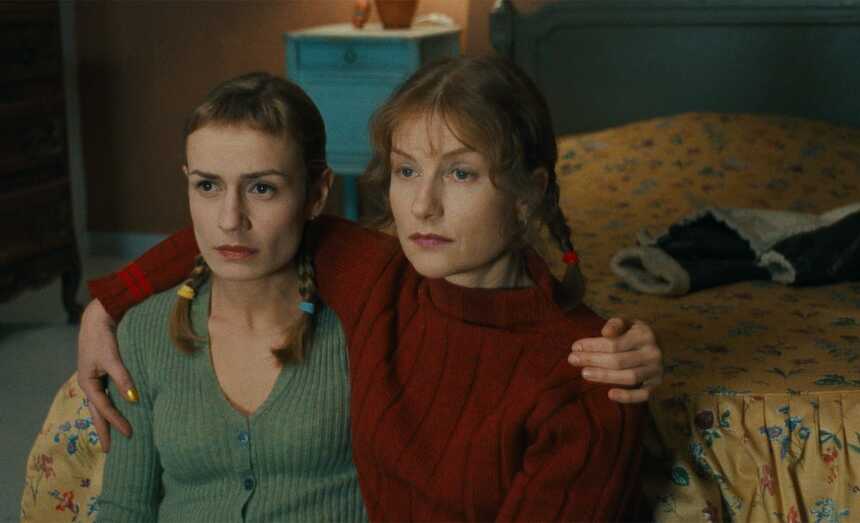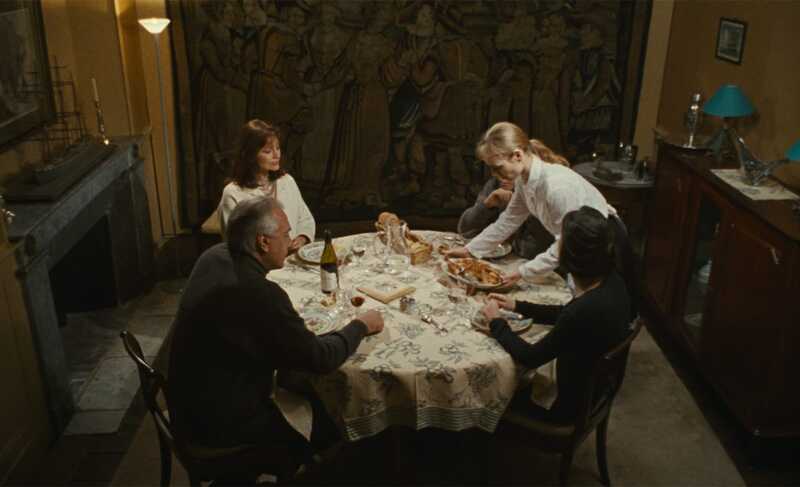THE CEREMONY Blu-ray Review: Claude Chabrol's Class Destruction Masterpiece

The phrase 'eat the rich' might be partly a joke, but it did originate in France, during the Reign Of Terror - it was pointed out by the leader a commune that, if the poor had nothing left to eat, they would eat those who left them in their poverty. As the phrase, and the recognition of what capitalism and the class system have done to our world, it's perhaps fitting to have a new edition of Claude Chabrol's The Ceremony (La Cérémonie) for our enjoyment and edification.
The 1997 film, based on the novel by UK author Ruth Rendell, which itself draws from a true story, tells of Sophie Bonhomme (Sandrine Bonnaire), a young woman who finds employment as a housekepper for the well-off family of Catherine (Jacqueline Bisset), Georges (Jean-Pierre Cassel) and their two children. It leaves her isolated on their country estate, with little to do in her off hours but watch trash television. She stumbles into a friendship with Jeanne (Isabelle Huppert), who works at the village post office. Where Sophie is shy and seemingly reserved, Jeanne is brash and makes no qualms about showing her anger and resentment towards those better off than herself.
As the women spend more time together, Sophie notices how her employers treat her - to her face, well enough. But when they think she doesn't hear them - or perhaps they don't care that she does - to them, she is just another tool they get to use. Sophie is also hiding the secret of her illiteracy - once that carries a social stigma, one that might have caused her to kill her father. And it seems, the combination of social stigma, ill treatment, and a friend who has no qualms about bad behaviour, will lead this woman to kill again.
Chabrol was one of the founding members of the French New Wave, but many of his films, particularly in his middle and late periods, tended (at least on the surface) towards more popular genres. He loved a good thriller and a good murder. But look just a little more closely, and there is definite method to his tastes. He once said of why so many of his films were about murder, "That's the area of human activity where the choices are most crucial and have the greatest consequences." The seemingly banal lives and circumstances are just that - seeming, whereas the great turmoil of class struggle lives in these most banal of places and people.
It seems, at first, that Jeanne is the one in control of the friendship - her brashness makes her the louder of the two by far, her willingness to say whatever comes to her mind, regardless of the consequences, and her seeming indifference to the death of her young daughter. But perhaps that's where the anger lies - this brashness hides a rage so deep and unfocused. In contrast, we might think Sophie as weak, as malleable - and yet, she took control enough to get this job, to deceive enough people into thinking the death of her father was an accident. She knows how she will be perceived if her secret of illiteracy is revealed.
Bonnaire's and Huppert's performances are both ones for the books. While Huppert ended up winning the César for her role, this is really Bonnaire's film. She has the argubaly harder job of portraying someone who keeps their rage and frustrations buried beneath so many layers, and the cold calculation with which she finally snaps and goes on her killing spree is truly terrifying.
Chabrol is a deceptively clever and complex filmmaker - he sneaks in this mix of the banal and the horrifying with such seemless continuity, that it's somewhat tempting to compare him to a filmmaker like David Lynch. Yet he eschews the more weird Lynchian style, instead understanding that it's ot that difficult to understand why, particularly for those who are marginalized, shunned, stigmatized, or otherwise isolated from a reasonable life, turning to acts of horror and violence is the only answer. And part of us cannot blame them, even if we could count as their victims.
Anyone who has seen Parasite (2019) would not be surprised to learn that Bong Joon Ho was strongly influenced by The Ceremony. The 12-minute introduction by the Korean filmmaker provides his loving examination of the film, the similarities with his own work, and his appreciation for Chabrol's work. Bong discusses his lov of Chabrol's humour like a 'dry and brittle pastry', his detachment and deceptive simplicity in presenting his themes and characters. It's a nice overview of the film, and perhaps good for someone who might not have seen it, and wants to know a little more before they dive in. Adding to these, is nearly 30 minutes of commentary given by Chabrol himself, from an earlier release of the film. It's only certain scenes - the serving of tea, looking for mushrooms, and of course, the climax or murder and mayhem. But Chabrol is an engaging speaker - formal in that he is precise with his words, understanding what his motivations were for choosing angles and lighting, and conveys that with a detachment that belies the depth of thought behind his work.
A 'Making of' programme from French television lets us watch Chabrol, his crew, and actors, on the set as they film. Chabrol gives a tour of the location, with his insights as to what works for drawing out his presentation of these two women who will seek their class revenge in its rooms and corridors. He refers to The Ceremony as 'the last Marxist film', though insists that he is not a Marxist himself. He also discusses how he updated Ruth Rendell, a writer he admires, to this last decade of the 20th century. Another television excerpt included is 'Crossed Portraits', about the working relationship and friendship between Huppert and Chabrol. Certainly it's one of the great actor-director pairings of our time: they made seven films together. Chabrol talks about their relationship being that of an uncle and niece; Huppert says how Chabrol would interject only if he wanted something different, or though there was something small missing from Huppert's performance.
That trust in his actors is echoed by Bonnaire. In an interview from 2020, she discusses how significant the role of Sophie in her career (certainly that and her role in Vagabond is what she is most known for). According to Bonnaire, Chabrol wanted the actor to take responsibility for the characters, that he trusted Bonnaire to find the hairstyle she thought her character would have, the make-up and clothing style, how she would carry herself. Once the actor had those ideas, Chabrol would discuss it with them. But it shows a trust in the performer to do their job, something not often seen in much of mainstream cinema today.
Co-screenwriter Caroline Eliacheff gives her analysis of the story's ideas, what she saw as the motivation for the characters, and the social stigma attached to the main character that drove her to her crime. There's a short video on the use of off screen sound, so important in the film, and you can watch it below. And finally, Sarah Weinman's excellent essay 'Domestic Disturbances' encapsulates why this film remains one of Chabrol's best and most lauded, with its attention to detail, its matter--of-fact presentation that only highlights the terror, and its focus on the quiet anger of women kept in the margins.
La Cérémonie
Director(s)
- Claude Chabrol
Writer(s)
- Ruth Rendell
- Claude Chabrol
- Caroline Eliacheff
Cast
- Isabelle Huppert
- Sandrine Bonnaire
- Jacqueline Bisset








